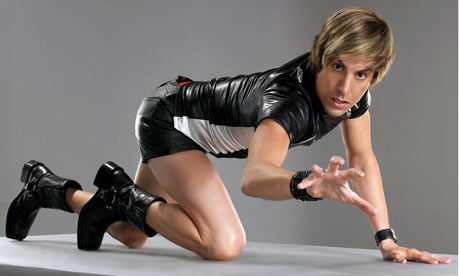
In the US it has been accused of promoting the very homophobia it lampoons, and the critics are at times unsure of whether Sacha Baron Cohen's latest film is possessed of a particularly admirable moral compass. What they do not argue over, however, is Bruno's ability to make the viewer laugh out loud and squirm in equal measure.
The tale of a gay TV presenter fired from his job arbiting the sartorial sensibilities of Austrian fashionistas after exploding on to a Milan catwalk in an outfit made of Velcro, and who then decides to seek his fame and fortune in LA, often misses the mark as a social satire, and is not nearly as worthy as it seems to think it is. Baron Cohen regularly comes out looking just as vapid as his character. Yet the movie is saved a million times over because of the comedic skill and improvisational brilliance of its star in wonderfully set-up situations, although there remains a serious question over whether some of them were at least partly faked.
"Bruno is a no-holds-barred comedy permitting several holds I had not dreamed of. The needle on my internal Laugh Meter went haywire, bouncing among hilarity, appreciation, shock, admiration, disgust, disbelief and appalled incredulity," writes Roger Ebert in the Chicago Sun-Times. "Here is a film that is 82 minutes long and doesn't contain 30 boring seconds. There should be a brief segment at the next Spirit Awards with John Waters conferring the Knighthood of Bad Taste to Sacha Baron Cohen. If he decides to tap Cohen on each shoulder with his sword, I want to have my eyes closed."
"This may not be every bit as funny as Borat and the latest film is – I admit it – a little further compromised by worries over fakery. Furthermore, at the very end, there is a disappointing parade of smirking A-listers treated with dismaying leniency and deference," writes our own Peter Bradshaw. "But this film is still howlingly funny, staggeringly rude, brutally incorrect and very often just brilliant. It has some really extraordinary, confrontational moments that live on in my traumatised mind in a continuous loop."
"While claims that the film is a social satire are as empty as Bruno's pretty head, there's no arguing with the fact that the film is staggeringly rude and very, very funny," says the Times's Wendy Ide. "The laughs build and build: it's like surfing a tidal wave of hysterical bad taste."
AO Scott in the New York Times is unusual in delivering a truly negative verdict. "In spite of Mr Baron Cohen and [director Larry] Charles's high-level skills and keen low-comic instincts, Bruno is a lazy piece of work that panders more than it provokes," he says.
"The episodic plot – Bruno comes to America with a sidekick from home (Gustaf Hammarsten), seeks fortune and fame, encounters humiliations to which he is obdurately immune and achieves a redemption of sorts – is a photocopy of Borat. Like a thrift-store outfit Bruno is an ensemble of borrowings, mostly from wittier, more inventive movies."
I have to say that I agree both with Scott and his more generous colleagues. Bruno is most definitely a guilty pleasure for viewers of a liberal disposition. The movie is hugely patronising, both of gay culture and the communities it criticises. The term "shooting fish in a barrel" has been used in several reviews, and there is something incandescently facile about Baron Cohen's approach and delivery. Yet it almost doesn't matter, for just when you think you've got a handle on him, the comic manages to pull something out of his bag of tricks that goes screaming through the bounds of taste.
In many ways, the film has more in common with a horror movie in terms of its dynamic: it is equally jumpy, employs the same type of shock tactics, and caused me to turn away from the screen on several occasions. It also causes the liberal viewer to confront his own latent homophobia: I felt myself wondering whether I might be just the tiniest bit anti-gay because I found the sight of a penis bobbing around the screen, or two men fondling each other in a cage surrounded by baying rednecks, somewhat disturbing.
What do you think? Does it matter that Bruno is politically incorrect? Isn't that sort of the point? Does the fact that Glaad have accused Baron Cohen of his own form of homophobia matter? Or that the film apes its predecessor in terms of structure? In fact, does anything really count apart from the fact that Bruno is achingly funny? Do please post your thoughts below.

